|
 
PopEntertainment.com > Feature
Interviews - Directors >
Feature Interviews
- Actors
>
Feature
Interviews A to E > Clint Eastwood
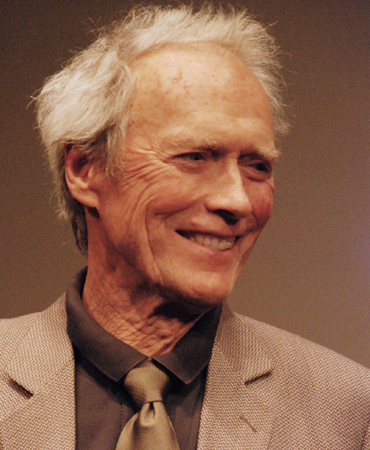 |
Clint Eastwood
Becomes a Changeling
by Brad Balfour |
An avowed Republican in Hollywood is nearly as rare as as the giant
Komodo Dragon — and they've had the spiteful bite of one as well.
But with Barack Obama's victory, they've made themselves pretty
scarce since election day.
Hell, even a straight-shooting, no bullshitter like Clint Eastwood —
long known as a registered Republican who supported Richard Nixon's
campaign in 1968, who has since made forays into politics (he won a
term as mayor of Carmel in 1986 and has been on the California State
Park and Recreation Commission from 2001 to 2008 and the California
Film Commission) — distanced himself from the Republicans before the
election. At a recent press conference that Clint Eastwood gave at
this year's New York Film Festival — where Changeling, his
latest directorial effort, premiered as the centerpiece — it was
uncanny how even he wanted to emphatically clarify his position away
from them.
Of course, that wasn't the only interesting thing he had to say
about himself and his film. So with a little juggling and a few
delays, here are the comments from this 78-year-old grand master of
directing and acting — the man who defined so many cinematic
archetypes from the hard-boiled, hardened cop (Dirty Harry)
to the laconic gunslinger with a heart (the Man With No Name from
Sergio Leone westerns). This Oscar-winning director (Unforgiven)
and longtime actor is also a jazz musician and composer as well.
Given that Changeling deals with out-of-control authorities
drunk on their own power, the film has a very current political
tenor. Starring Angelina Jolie as a mother searching for her
nine-year son, she is given the wrong kid when he is returned by
corrupt L.A. police officials; she's then carted off to the looney
bin when she protests. Once freed by a crusading minister after it's
revealed that a serial killer may have abducted her son, she
succeeds in bringing down the authorities who have done her wrong.
So Eastwood's remarks remain particularly telling.
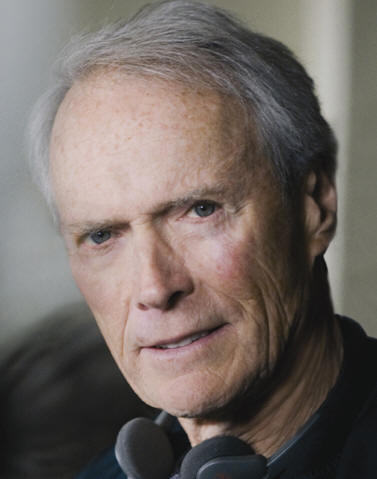 As
a noted Republican, former elected official, and supporter of John
McCain, what are your thoughts on the election, especially Sarah
Palin? As
a noted Republican, former elected official, and supporter of John
McCain, what are your thoughts on the election, especially Sarah
Palin?
My mortgage just went down the tube [laughs]. I haven't been
very active in politics. Yes, I started out as a Republican in 1951,
when I was a young 21-year-old in the army, and I wanted to vote for
Dwight Eisenhower because he, like all politicians, was promising
something, and he promised to go to Korea and end the Korean War.
But the Republican Party, as the Democratic Party, have changed
dramatically since the 1950s, and so I've drifted towards a more
libertarian point of view. It never really got going as a party, but
just the idea of, "Let's leave everybody alone, and not
over-regulate," was very appealing to a guy like myself, who came up
in the 1930s and watched my parents struggle through the Depression.
And nowadays of course, everybody's promising everything because
that's the only way you can get elected. It's kind of perverted
politics, as far as I'm concerned.
Whether Mr. McCain or Mr. Obama… what ever happens there, who knows…
there are promises going on there too of what people will do and
what people won't do, and it's very confusing. But yeah, my wife and
I are both Libertarian; she was a Democrat and I was a Republican,
and we both met in the middle somewhere.
Both this film and Million Dollar Baby deal with female
protagonists rebelling against a very male-dominated society. Prior
to this, your earlier films were involved with very male-centric
cinematic universes. So what triggered this change to the
perspective of the female?
It just got very feminine in here [laughs]. I know I've done
a lot of action films in my early days, but I've always been curious
about these stories. I remember doing Bridges of Madison County
some years back, and that was a story written from a man's point of
view. The book was a story of a guy who's a photographer, and he
drifts across the country, and he meets a war-bride, and the writer
in that case took the woman's point of view, so the screenwriter
actually had a better take on it than the novelist.
But I don't know, every story has its demands, and I think women
have had a much more uphill battle than men had, so it becomes a
more dramatic situation. It's like Million Dollar Baby, with
a woman who's destitute, and broke, and wants to make something of
herself in the world.
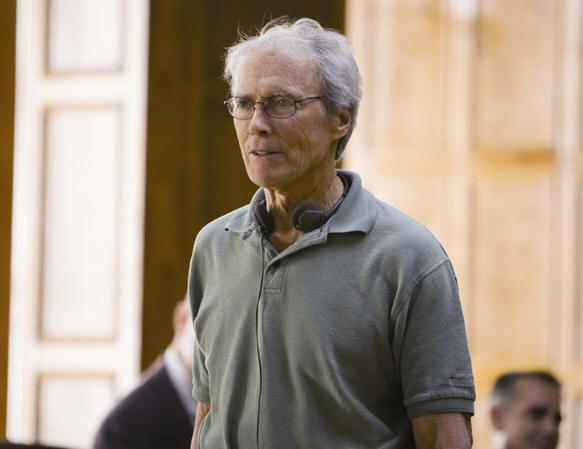 There
are moments in the film that have a very powerful, contemporary
resonance, almost as if while you're talking about a specific case
from 1928. These are issues and themes that have a very strong
pertinence today, especially concerning corruption, and the way
power justifies its use of corruption. There
are moments in the film that have a very powerful, contemporary
resonance, almost as if while you're talking about a specific case
from 1928. These are issues and themes that have a very strong
pertinence today, especially concerning corruption, and the way
power justifies its use of corruption.
Yeah, well, there's definitely a correlation to corruption of today,
as it was then. And it's the egos of the police department, and they
can't be wrong, and we see that happen nowadays very often, and if
you can make that connection to what's happening today, then that's
a good thing. At the same time, you don't want to leave the
vernacular and the character of that time.
Why did you want to turn the actual historical incident into a
film?
I didn't know too much about the incident, and was surprised that I
hadn't heard about it because it was such an unusual event.
Historically, Los Angeles has had some crazy situations, but this
one was very unusual.
I didn't know anything about it until I read the script. But the
writer [J. Michael Straczynski] did a very interesting thing: he
took all of the clips from the Los Angeles Times and The
Herald — newspapers of that day — and pinned them on the back of
every page [of the script]. It came to life as a very horrible time,
and he did a very interesting thing by taking the story of a woman,
as opposed to the story of a
crime.
The period detail was very impressive in Changeling — in
particular, the use of vernacular which captured the feel of the way
people lived in the 1920s. How did you accomplish this?
The writer had a pretty good take on it. And I was born in 1930, and
since I was raised through the '30s, the vernacular is still fresh
in my brain… somewhat [laughs]. But anyway, I guess I can
remember my parents were very young when I was growing up, and you
listen to it, and you know what people said then, and how they were
much different from what they are now.
To do a 1928 film in Los Angeles — or any city really, but
especially Los Angeles because it's changed so much over the years
and wasn't a very centralized or big city, compared to New York…
Things have changed a lot. So to go back and do that is very
difficult, and it takes a lot of scouting around, and good art
direction.
Did you shoot all of the exteriors in Los Angeles?
Yeah, we shot everything there. And we found neighborhoods that were
still antique, and we antiqued them some more. We'd go into a
neighborhood that's kind of rundown and we'd ask people if we could
use their neighborhood, and then we'd fix their house and make it
look like a new house that's from 1928.
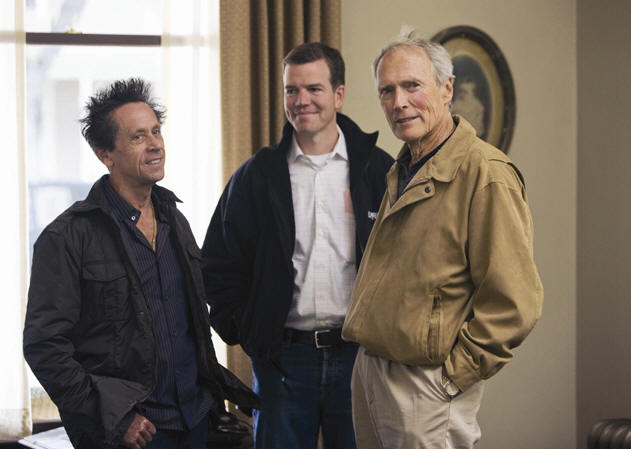 The
character played by John Malkovich — the crusading, muckraking
preacher — was intriguing. Is he based on an actual historical
figure or is he an amalgamation of several people? The
character played by John Malkovich — the crusading, muckraking
preacher — was intriguing. Is he based on an actual historical
figure or is he an amalgamation of several people?
These figures all existed. It's actually a true story. Detective
Ybarra [Michael Kelly], he existed. Malkovich was a Presbyterian
minister [Rev. Gustav Briegleb] who had a church down by the
Coliseum in Los Angeles — that church is no longer there — but he
was very much of an activist, and he had a radio show that he
broadcast. He loved high-profile cases, and he had a big deal
against the LAPD, so he had quite a few cases that he did this with.
And when the Christine Collins case became very high-profile he
jumped in, and became very helpful in encouraging her, because women
at that particular time — they were much more reticent about being
outspoken, so you can imagine how uphill it was against a
predominantly male police department and political establishment.
Because of the sensational aspects of the story, how did you
avoid melodrama?
Los Angeles was sort of glamorized years ago in film noir. But
sometimes reality is much more interesting than fiction, and the
melodrama just comes out of the reality of the situation. It sort of
harkens back to films that we grew up with — films like Gaslight
where people are trying to bend your [woman's] mind, and tell
you things that aren't really as they are.
And that's exactly what the LAPD tried to do with Christine Collins.
They convinced her to the point where they had pictures of her
sitting there smiling with this young child that doesn't look
anything like her child. And then they put her in the psychopathic
ward just because they figured they'd get her out of the way. They
didn't have the information age that we do now with TV and the
Internet, so one can't imagine how many cases were swept under the
table.
What were some of the major changes between the story we see
onscreen and the real story?
The story you see onscreen is the real story, but the writer took it
and concentrated on the woman's point of view, and what happened to
her. There's a few things left out. If you read the material on [the
serial killer] Gordon Stuart Northcott [Jason Butler Harner], it's
just horrendous. It's very hard stuff to read, because the guy was
such a deviant, and the whole family was rather inbred — or they
seemed that.
It's kind of a tough story to get a line on. I was surprised [Straczynski]
took the line he did, but it was great that he did that, because
then the detective story and the unraveling of the mystery all comes
later on. [Collins] gets all the way up to where she's put into a
psychiatric ward before we even start on the story of what happened
to the child.
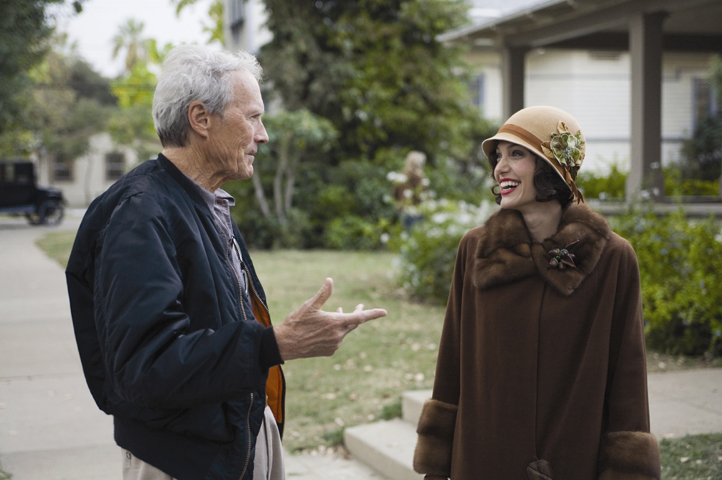 What
was it like working with Angelina Jolie? What
was it like working with Angelina Jolie?
[Grimaces] I forgot… [laughs]. Very good. I didn't
know Angelina very well before doing this. I had met her on a few
occasions, but I always thought of her as a very interesting
actress, a very good actress. And in recent years of course she's
had so much publicity, being on the cover of every possible
publication in the world here, and you start taking it for granted.
A lot of people get on the cover of magazines and it doesn't
necessarily mean they're talented, but in her case, she is really
talented. And she's the most prepared actress — or certainly as
prepared — as any actress I've ever worked with.
She came in with the material in her mind, with an attack on the
character, was very amenable, and you could shoot almost
immediately, which was something I like to do. I like to catch
somebody before they have a chance to think about it too much; like
they haven't spoken the words so many times that it's flat. And
there's a subliminal thing where you look in their eyes, and it's
the 10th or 20th time they've done it… You try for it in the early
moments when they're still reaching for it and still trying to
figure it out, but she's very amenable to that. And she does have
the most striking face that one could imagine.
You got some great performances from the actors you cast as the
cops, the serial killer and the kids. How was it working with such
fine young actors?
Well, it's a great thing. That's one of the reasons in my senior
years I stay behind the camera, and let the younger people out there
take the ball and run with it. It's a great pleasure these days to
watch the talent come along. I'm always amazed at how good some of
them are at such young ages, because it took me forever to say my
own name [laughs].
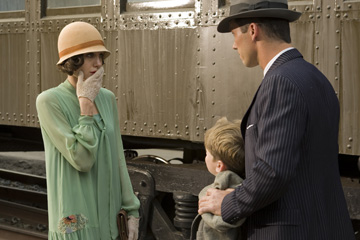 And
then there's your role as composer of the film... And
then there's your role as composer of the film...
Well, he does exactly what the director wants [laughs]. When
you're making a film you start living with it, and I find myself
sitting down and figuring out a sound or melody that would go with a
film, or a particular period. It's not brain surgery; you just kind
of feel it along.
I wrote a theme for Unforgiven years ago, and I wrote that
long before I made the film. I just sort of felt like a guy would be
playing a guitar somewhere with a very lonely feel, and I wrote
that, and developed it later on. This one I wrote a lot of times as
we were editing the film.
Do you contemplate giving up your own acting career in favor of
directing?
Well. I thought about it after watching all those young actors, but
since this picture was completed this year, I've done another film
in which I performed in, even though I said I wasn't going to do
that anymore.
I started saying that a few years ago: "I don't think I'll act
anymore and stay behind the camera," and then Million Dollar Baby
came along, and I liked that role. And I said, "Well, I'll do this
role, because I think I'm right for it." And then I did another one,
which is called Gran Torino [Eastwood plays a disgruntled
Korean War vet] which we just finished and is in post-production
now. It's with Warner Brothers, and it comes out in December.
Email us Let us know what you think.
Features
Return to the features page

|
Photo Credits: |
|
#1 © 2008 Brad Balfour. All rights reserved. |
|
#2 © 2008. Courtesy
of Universal
Pictures. All rights reserved. |
|
#3 © 2008. Courtesy
of Universal
Pictures. All rights reserved. |
|
#4 © 2008. Courtesy
of Universal
Pictures. All rights reserved. |
|
#5 © 2008. Courtesy
of Universal
Pictures. All rights reserved. |
|
#6 © 2008. Courtesy
of Universal
Pictures. All rights reserved. |
|
#7 © 2008. Courtesy
of Universal
Pictures. All rights reserved. |
Copyright ©2008 PopEntertainment.com. All rights reserved.
Posted: November 7, 2008. |

 
 
 

Copyright ©2008 PopEntertainment.com. All rights reserved.
Posted: November 7, 2008. |